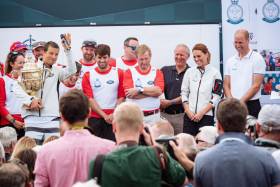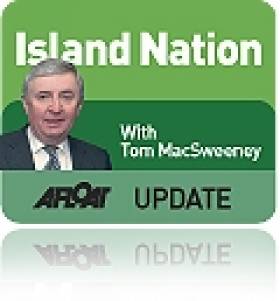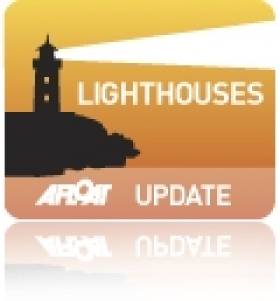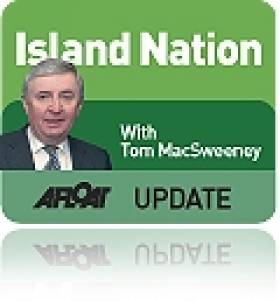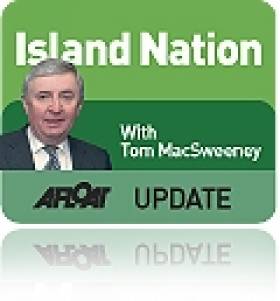Displaying items by tag: Enda Kenny
Former Taoiseach Enda Kenny On Winning Crew In Royal Regatta
Enda Kenny can add his name to the list of Irish yachting politicians as he crewed adventurer Bear Grylls’ regatta winning boat Tusk in Cowes yesterday (Thursday 8 August), as TheJournal.ie reports.
The former Taoiseach was taking part in the charity event for The King’s Cup that also saw the Duke and Duchess of Cambridge, William and Kate, go head to head in competing vessels along the eight-boat fleet.
It’s not clear whether Fine Gael colleague Simon Coveney, whose family has long been a part of the Cork sailing community, gave his erstwhile boss any pointers for the event — nor whether the sailing bug has bitten him like it did the late Charlie Haughey in the 1980s.
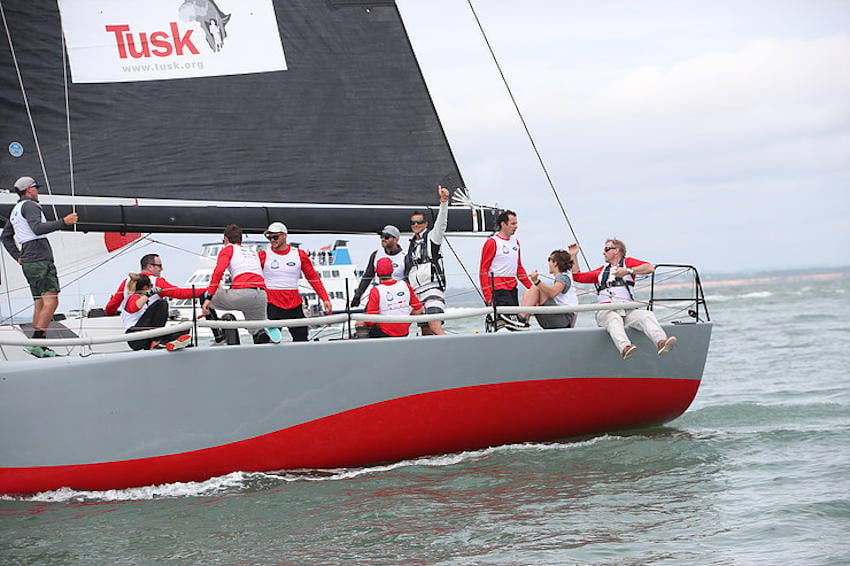 Tusk crosses the finish line with Bear Grylls at the helm to win The King’s Cup | Ian Roman/King's Cup
Tusk crosses the finish line with Bear Grylls at the helm to win The King’s Cup | Ian Roman/King's Cup
The King’s Cup heralds 2019’s Cowes Week, which will have a delayed start as the opening day’s racing tomorrow (Saturday 10 August) has been suspended due to the poor weather forecast.
Harnessing Our Ocean Wealth: Understand Backwards – Look Forwards
#islandnation – "Life can only be understood backwards, but it must be lived forwards."
It was Søren Aabye Kierkegaard, a 19th century Danish philosopher and theologian, who penned those words. His approach to philosophy was to leave the reader of his words to discover the meaning.
The philosophical approach of Kierkegaard relates in my thoughts to the State attitude towards the maritime sphere. Without seafarers and the sea this island nation could not survive. That fact appears to still elude the understanding of many in Government administration. Looking backwards, I appreciate the launch in mid-year of the Government's plan for the development of the maritime sector when Enda Kenny said:
"As Taoiseach, I want to see us reconnect to the sea in a way that harnesses the ideas, innovation and knowledge of all our people, at home and abroad. I want to see us setting out to secure for ourselves and our children the social, cultural and economic benefits that our marine assets can deliver."
Encouraging words at the announcement of the Government's integrated marine plan for Ireland – "HARNESSING OUR OCEAN WEALTH".
But, as Kierkeggard, said: "life must be lived forwards..." so I wait to discover what the Taoiseach meant by those words and to see how the plan is developed into 2015.
Reflection and resolution are traditional at this time of the year, so in pursuance of the thinking of Kierkegaard I reflect on my first year of broadcasting outside of the State service, an experience which has been interesting and which has underlined to me the importance of developing community, by co-operation, through opinion and action. From starting with just one radio station there are now four broadcasting THIS ISLAND NATION fortnightly, in Cork, Dublin and Clare and with, hopefully, more to join "the family of the sea" in the year ahead and two websites, including Afloat.ie
This edition of THIS ISLAND NATION looks back at some of the community-based stories broadcast in the past year.
Fair sailing into the New Year...
Taoiseach to Open Exhibition at Loop Head Lighthouse
#LOOP HEAD LIGHTHOUSE – An Taoiseach Enda Kenny is to officially open a new exhibition at the Loop Head Lighthouse and to launch the 2012 visitor season at the west Clare tourist attraction on 18th May.
The Clare Herald also reports that the Taoiseach's grandfather, James McGinley was a former keeper at the lighthouse (still in operation) which can date its origins back to the 1670s.
Clare County Council, along with Shannon Development, Loop Head Tourism and the Commissioners of Irish Lights, conducted a successful trial scheme in 2011 that resulted in an estimated 17,000 people visiting the landmark building. This year's season will see the visitor attraction open to the public from 19th May.
In addition the Irish Landmark Trust rents out a five-bed former lighthouse-keepers house. The property stands in the grounds of the navigation landmark located at the mouth of the Shannon Estuary.
Is 'Marine' Being Got At Again?
My view was that it was a substantial change and that the pre-Election pledge of Fine Gael to co-ordinate all maritime aspects under one Department was being delivered upon and I welcomed the appointment.
But this week it has been pointed out that, while the names of other Government Departments have already been changed to their new designations under the Ministerial appointments announced in the Dail, this has not been done where the marine is concerned. The Department of the Taoiseach's website lists Simon Coveney's Department as "Agriculture, Fisheries & Food" and the Department is so far retaining that title. Its press releases have describe Coveney as "Minister for Agriculture, Food and Marine," not what the Taoiseach announced in the Dail.
This is not pedantic, but a reasonable issue to raise bearing in mind past marine experience. When Bertie Ahern abolished the Department of the Marine and assigned duties to the "Minister for Transport and Marine" in the last Government, top civil servants in that Department removed "marine" from its title. When I questioned that, I was told that a meeting of those officials had been held and that decision had been made.
So, I asked the Department of the Taoiseach this week, what exactly is the title of Simon Coveney's department. To the time of writing this column, no response has been received.
When he was Fine Gael Leader, Enda Kenny told me in a radio interview of his pride in the maritime connections of his family which had been involved in the lighthouse service.
I asked the Department of "Agriculture, Fisheries and Food" press office why "marine" was listed as third in the Minister's role rather than second, as described in the Dail. I was told that arrangements and decisions and an "SI" - "statutory instrument" - were awaited.
I will be interested to see how long that takes..
This article is reprinted by permission of the EVENING ECHO newspaper, Cork, where Tom MacSweeney writes maritime columns twice weekly. Evening Echo website: www.eecho.ie
Marine is Back
It is a reminder which I hope that the media in general will note and that his tile of Marine will be used as often as agriculture is. The general media has been notorious, in my view, for disregarding the marine sector unless there is disaster, emergency or controversy involved.
The return of the title 'Marine' to a Government Department is, to put it bluntly, a kick-in-the-ass which civil servants needed. It was a betrayal of this island nation's heritage when those in charge of the former Department of Transport held a meeting which decided to remove the title marine from the Department's name, even though the then Minister had been assigned the role of Minister for Transport and Marine. The man in charge of that Department, Noel Dempsey, did not demonstrate a lot of interest in the marine, being more noted for trying to shut down the coastal radio stations at Valentia and Malin, where he was beaten off by public opposition, which also happened when he tried to remove 24-hour rescue helicopter service in the south-east and for his introduction of laws which criminalised fishermen.
Hopefully, the restoration of 'Marine' to a Department's name will be the harbinger of better things for the marine sphere.
I have heard some disappointment expressed that the marine is not a department on its own, but what the Fine Gael and subsequently Coalition Programme for Government agreed by Enda Kenny and Eamon Gilmore said was: "Marine responsibilities will be merged under one Department, for better co-ordination in policy delivery."
They have been, though some of the finer detail remains to be seen, such as will the ports be moved away from Transport, to where port companies and commercial interests originally campaigned to have them moved? And how will the split of marine tourism work between Agriculture and Marine and the separate tourism department? A similar issue may arise in regard to sailing and sport, but it seems to me a positive step that the disregard which Fianna Fáil and the Greens showed for the marine sector is being changed.
It was also right to end a separate department for defence. With a small army and navy, smaller than the marine sector, it was nonsense that it should have been a department of its own.
Let us therefore, hope for the future and take a positive view of the change as being for the better.
Programme for Government will Reinstate Marine Department
It maybe the second last item on the programme for government issued by Enda Kenny and Eamon Gilmore yesterday but the indications are good that the marine sector will see a reinstated Department of the Marine. the Fine Gael and Labour coalition say 'marine responsibilities will be merged under one Department, for better co-ordination in policy delivery'. Here is the relevant excerpt:
Coastal communities, fisheries & marine environment
We will negotiate the best possible deal for fishermen in the review of the Common Fisheries Policy.
We will support the development of sustainable aquaculture and fish farms by streamlining the licensing process and reducing associated bureaucracy.
Marine responsibilities will be merged under one Department, for better co-ordination in policy delivery. We will develop an integrated marine and coastal planning process in order to maximise the potential of Ireland's coastline in fishing, aquaculture, ocean energy and tourism.
A Sea Fisheries Sustainability Impact Assessment, based on consultation with all major stakeholders, will be brought before the Dáil annually before EU fisheries negotiations commence.
We will replace criminal sanctions system for minor fisheries offences with administrative sanction system to bring Ireland into line with other European jurisdictions. Safety at sea and decent working conditions must underpin the development of the fisheries sector. We will explore the provision of an emergency towing vessel for the Coastguard.


























